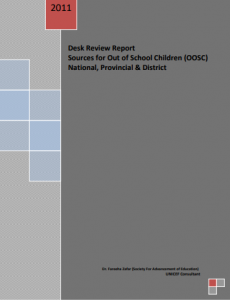 Access to education is not only considered a basic human right but also a service that ―must be
Access to education is not only considered a basic human right but also a service that ―must be
provided to the populace, irrespective of affordability, and it is generally considered to be the
responsibility of the state to deliver primary education.‖1 Unfortunately, in the case of Pakistan,
this sector has suffered from neglect and inadequate allocation of resources on the part of the
government leading to critical deficiencies in terms of coverage, efficacy and quality.
Consequently, Pakistan‘s literacy and primary enrolment ratios remain short of the Millennium
Development Goals and the objectives set in its own National Education Policy. Even the
significant development aid directed towards the Pakistani education sector has not had a
sufficient impact due to high levels of corruption and mismanagement of funding within the
government ranks. Furthermore, many of the initiatives undertaken by the government and nonprofit organizations are not well-coordinated, and hence their effect is minimal.
